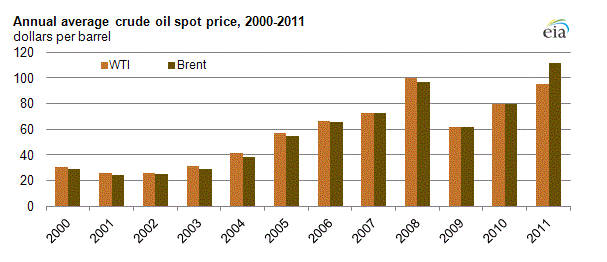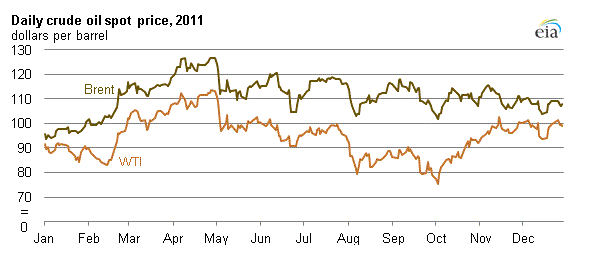Upward Pressure to Remain on Brent Crude Oil in 2012
Commodities / Crude Oil Jan 16, 2012 - 01:03 PM GMTBy: Investment_U
 David Fessler writes: Oil prices have traded off a few dollars from their recent highs. The factors that will keep Brent above $100 a barrel for 2012 are the same ones that kept it above $100 all of last year.
David Fessler writes: Oil prices have traded off a few dollars from their recent highs. The factors that will keep Brent above $100 a barrel for 2012 are the same ones that kept it above $100 all of last year.
Take a look at the graph below, courtesy of the Energy Information Administration.

Brent spot prices averaged $111.26 a barrel for 2011. That was the first time in the history of oil that Brent averaged over $100 a barrel for an entire year.
West Texas Intermediate (WTI) averaged $94.87 a barrel, up $15 a barrel from 2010. WTI pricing reflected a discount to Brent based on supply constrains emanating from the Cushing, Oklahoma storage depot.
What’s Going to Keep Crude High in 2012?
Let’s start with the Arab Spring that’s already turned into the Arab Year. If Iran goes ballistic (no pun intended) and Iraq comes apart at the seams, it could turn into the Arab Decade.
Any sudden supply loss resulting from the closing of the Straight of Hormuz will send prices soaring. Even if nothing happens, prices will stay high until the standoff settles down.
Now let’s talk about demand. In the face of all the unrest that threatens 17 million barrels per day of world supply, we have increasing demand. As I write this, China is negotiating with Iran for cheaper prices on oil.
The country gets about 11% of its oil from Iran, and now it can get it cheaper, since its oil is effectively isolated from the rest of the world. The boycott takes Iran’s 2.6 million barrels per day off the world’s supply.
But China, India and the Middle East all experienced increasing demand for crude in 2011. During the first six months of last year, crude demand for countries not part of the Organization for Economic Cooperation and Development (OECD) saw demand increase 4%.
Even with declining OECD demand, overall world demand for crude increased by 1.2% in 2011. That growth will continue in 2012, keeping upward pressure on prices.
The third factor keeping crude prices high this year will be continued transportation bottlenecks. The giant Cushing Oklahoma crude storage facility is capacity limited to get crude out to Gulf Coast refineries.
The reversal of the Seaway Pipeline this June will partially alleviate this. The real problem is that crude production is ramping in Alberta’s oil sands, and North Dakota (the Bakken) and Texas’ (Eagle Ford) shale plays.
More oil is flowing into Cushing than can flow out. The facility is adding storage at a frenetic pace, and should have the capability to store an additional three million barrels later this year.
The lack of access to West Texas Intermediate (the Cushing benchmark) caused it to trade at a significant discount to Brent last year. In September, that discount was nearly $30 per barrel.
You can see the price of the two benchmarks in the graph below.

Right now the spread is close to $10 a barrel, which is wide by historical standards. I expect that to continue to remain in the $10 to $20 per barrel range, since there’s little that will improve the accessibility of WTI in the short term.
The bottom line is this: Don’t expect oil prices to drop. Increasing demand and geopolitical unrest will keep Brent crude prices above $100 for a second year in a row.
Good investing,
Source: http://www.investmentu.com/2012/January/upward-pressure-to-remain-on-brent-crude-in-2012.html
by David Fessler, Advisory Panelist, Investment U
Copyright © 1999 - 2012 by The Oxford Club, L.L.C All Rights Reserved. Protected by copyright laws of the United States and international treaties. Any reproduction, copying, or redistribution (electronic or otherwise, including on the world wide web), of content from this website, in whole or in part, is strictly prohibited without the express written permission of Investment U, Attn: Member Services , 105 West Monument Street, Baltimore, MD 21201 Email: CustomerService@InvestmentU.com
Disclaimer: Investment U Disclaimer: Nothing published by Investment U should be considered personalized investment advice. Although our employees may answer your general customer service questions, they are not licensed under securities laws to address your particular investment situation. No communication by our employees to you should be deemed as personalized investment advice. We expressly forbid our writers from having a financial interest in any security recommended to our readers. All of our employees and agents must wait 24 hours after on-line publication or 72 hours after the mailing of printed-only publication prior to following an initial recommendation. Any investments recommended by Investment U should be made only after consulting with your investment advisor and only after reviewing the prospectus or financial statements of the company.
Investment U Archive |
© 2005-2022 http://www.MarketOracle.co.uk - The Market Oracle is a FREE Daily Financial Markets Analysis & Forecasting online publication.



